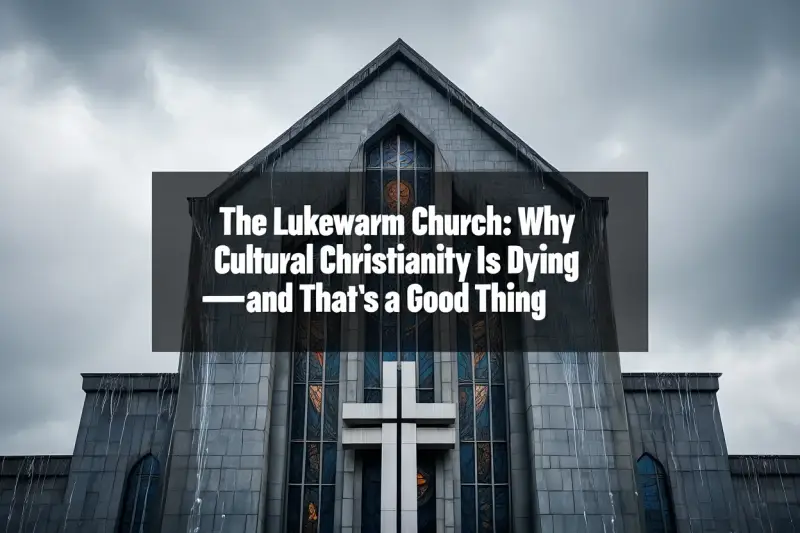By David N. Harding, Staff Writer

“I know your deeds, that you are neither cold nor hot. I wish you were either one or the other! So, because you are lukewarm—neither hot nor cold—I am about to spit you out of my mouth.”
— Revelation 3:15–16
For decades, many Christians in America have lived under the illusion that this country is a “Christian nation” simply because church buildings are common, politicians quote Scripture, and Christmas still shows up on the calendar. But make no mistake: we are not in Kansas anymore—and we haven’t been for quite some time.
The decline of Christianity in American public life isn’t a glitch in the system. It’s a purge. And strangely enough, that might be one of the best things that could happen to the Church.
What Is “Cultural Christianity”?
Cultural Christianity is a religion of convenience. It’s not the faith of the apostles, but the faith of the comfortable. It trades conviction for custom. It offers the cross without the cost. Millions have identified as Christians, not out of love for Christ, but because it was socially acceptable—or even advantageous—to do so.
This form of religion masquerades as the real thing, but it lacks the power, passion, and purity that defines biblical Christianity. It’s the Laodicean church in Revelation 3—lukewarm, self-sufficient, and spiritually bankrupt. And Jesus wasn’t impressed.
He didn’t say He was disappointed. He said He was about to vomit.
America’s Religious Shift: Not as Bad as It Seems
It’s true that religious affiliation in America is shrinking. According to the Pew Research Center, Christianity is on track to become a minority religion in the U.S. by 2070 if current trends continue (Pew Research). Meanwhile, Gallup reports that church membership has fallen below 50% for the first time in American history (Gallup).
To some, this seems like a crisis. But in reality, it’s a cleansing.
The people walking away from Christianity are, by and large, those who were never truly following Christ to begin with. Their beliefs were inherited, not personal. They may have grown up in pews but never grew roots in Christ. When the culture changed, their shallow faith collapsed.
As some Christian thinkers have noted, we’re not witnessing the collapse of Christianity—we’re witnessing the collapse of an illusion.
Why the Death of Cultural Christianity Is a Blessing
1. It Forces the Church to Choose Sides
The age of Christian nominalism is over. You can no longer ride the fence. You’re either in or out. Today’s culture demands clarity. Do you stand for biblical truth on marriage, gender, life, and salvation—or do you twist Scripture to appease the crowd?
This new reality forces churches to drop the act. As the cost of discipleship rises, only the truly devoted remain—those who would rather be faithful than fashionable.
2. It Purifies the Body of Christ
God often refines His people through pressure. Consider the early church—persecuted, scattered, and even martyred—yet bursting with spiritual power. In China, for example, where Christianity is tightly controlled, the underground Church has grown explosively despite opposition (Barna Group). Historically, persecution has purified the Church and ignited revival.
In America, the Church has long been comfortable. But comfort breeds compromise. As that comfort fades, purity and power are returning.
3. It Creates Authentic Witness
Cultural Christians don’t convert the lost—they confuse them. They live like the world, talk like the world, and love what the world loves, yet still claim the name of Christ. That kind of hypocrisy turns people away from faith.
But as cultural Christianity dies off, what remains is a smaller, more authentic Church—one that dares to be different. In a post-Christian society, even lukewarm faith can seem radical. But genuine, gospel-driven lives lived with conviction? That kind of faith becomes a beacon.
The Biblical Blueprint for Today’s Church
We are witnessing the end of the Church as a cultural institution and the rebirth of the Church as a countercultural movement. That’s how it started. That’s how it thrived. And that’s how it will thrive again.
It’s time to reclaim the radical nature of biblical Christianity—not radical in extremism, but radical in roots. A radical Church is a rooted Church: grounded in Scripture, fueled by the Holy Spirit, and unashamed of the truth.
That means:
-
Preaching the whole Gospel, including the parts the world finds offensive.
-
Living lives of holiness and integrity.
-
Training up children and new believers with courage and conviction.
-
Refusing to conform to the world’s moral confusion.
-
Preparing to suffer—not just survive—in a post-Christian society.
As the Apostle Paul reminds us, "We rejoice in our sufferings, knowing that suffering produces endurance, and endurance produces character, and character produces hope" (Romans 5:3–4, Bible Gateway).
Conclusion: The Remnant Is Rising
Yes, churches are closing. Yes, influence is fading. But what if all of that is a mercy?
What if God is stripping away the dead wood so something real can grow?
The Bible never promised us cultural dominance. It promised us persecution and power. Jesus doesn’t want fans—He wants followers. He doesn’t want part-time believers—He wants sold-out disciples.
So let cultural Christianity die. Let it crumble. What rises from its ashes may be smaller, but it will be stronger, braver, and ready for battle.
"He who has an ear, let him hear what the Spirit says to the churches."
— Revelation 3:22 (Bible Gateway)
#RemnantRising #biblicalchristianity #FaithOverComfort #nocompromisefaith #ChurchAwakening #TruthInLove #lukewarmnomore #RevivalIsComing



Add comment
Comments